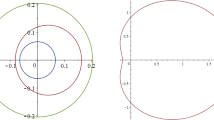Abstract
We discuss the theory of iterated polynomials, which is motivated because it is rich, beautiful, and interesting, but not primarily because it is useful. We then discuss the dynamics of the Newton method for finding roots of smooth functions, which is most useful. And finally, we show that they are closely related, and that work on the useful aspects requires deep knowledge of the ‘useless’ theory. This is an appeal against disintegrating mathematics (or science at large) into ‘useful’ and ‘useless’ parts.
Access this chapter
Tax calculation will be finalised at checkout
Purchases are for personal use only
Preview
Unable to display preview. Download preview PDF.
Similar content being viewed by others
References
Arnaud Chéritat, The hunt for Julia sets with positive measure. In: Dierk Schleicher (editor), Complex Dynamics: Families and Friends, pp. 539–559. AK Peters, Wellesley (2009)
Adrien Douady and John Hubbard, Etude dynamique des pôlynomes complexes (the “Orsay Notes”). Publications Mathématiques d’Orsay 84-02 (1984) and 85-04 (1985)
W. Timothy Gowers, How do IMO problems compare with research problems? Ramsey theory as a case study. In: Dierk Schleicher and Malte Lackmann (editors), An Invitation to Mathematics: From Competitions to Research, pp. 55–69. Springer, Heidelberg (2011)
John H. Hubbard, Dierk Schleicher, and Scott Sutherland, How to find all roots of complex polynomials by Newton’s method. Inventiones Mathematicae 146, 1–33 (2001)
John Milnor, Dynamics in One Complex Variable, third edition. Princeton University Press, Princeton (2006)
Johannes Rückert, Rational and transcendental Newton maps. In: Mikhail Lyubich and Michael Yampolsky (editors), Holomorphic Dynamics and Renormalization. A Volume in Honour of John Milnor’s 75th Birthday, Fields Institute Communications, volume 53, pp. 197–212. American Mathematical Society, Providence (2008)
Dierk Schleicher, Newton’s method as a dynamical system: efficient root finding of polynomials and the Riemann ζ function. In: Mikhail Lyubich and Michael Yampolsky (editors), Holomorphic Dynamics and Renormalization. A Volume in Honour of John Milnor’s 75th Birthday, Fields Institute Communications, volume 53, pp. 213–224. American Mathematical Society, Providence (2008)
Stephen Smale, On the efficiency of algorithms of analysis. Bulletin of the American Mathematical Society (New Series) 13(2), 87–121 (1985)
Tan Lei, Branched coverings and cubic Newton maps. Fundamenta Mathematicae 154, 207–260 (1997)
Terence Tao, Structure and randomness in the prime numbers. In: Dierk Schleicher and Malte Lackmann (editors), An Invitation to Mathematics: From Competitions to Research, pp. 1–7. Springer, Heidelberg (2011)
William Thurston, On the geometry and dynamics of iterated rational maps. Manuscript (1982). In: Dierk Schleicher (editor), Complex Dynamics: Families and Friends, pp. 3–137. AK Peters, Wellesley (2009)
Jean-Christophe Yoccoz, Small divisors: number theory in dynamical systems. In: Dierk Schleicher and Malte Lackmann (editors), An Invitation to Mathematics: From Competitions to Research, pp. 43–54. Springer, Heidelberg (2011)
Author information
Authors and Affiliations
Corresponding author
Editor information
Editors and Affiliations
Rights and permissions
Copyright information
© 2011 Springer-Verlag Berlin Heidelberg
About this chapter
Cite this chapter
Schleicher, D. (2011). Complex Dynamics, the Mandelbrot Set, and Newton’s Method — or: On Useless and Useful Mathematics. In: Schleicher, D., Lackmann, M. (eds) An Invitation to Mathematics. Springer, Berlin, Heidelberg. https://doi.org/10.1007/978-3-642-19533-4_14
Download citation
DOI: https://doi.org/10.1007/978-3-642-19533-4_14
Publisher Name: Springer, Berlin, Heidelberg
Print ISBN: 978-3-642-19532-7
Online ISBN: 978-3-642-19533-4
eBook Packages: Mathematics and StatisticsMathematics and Statistics (R0)




